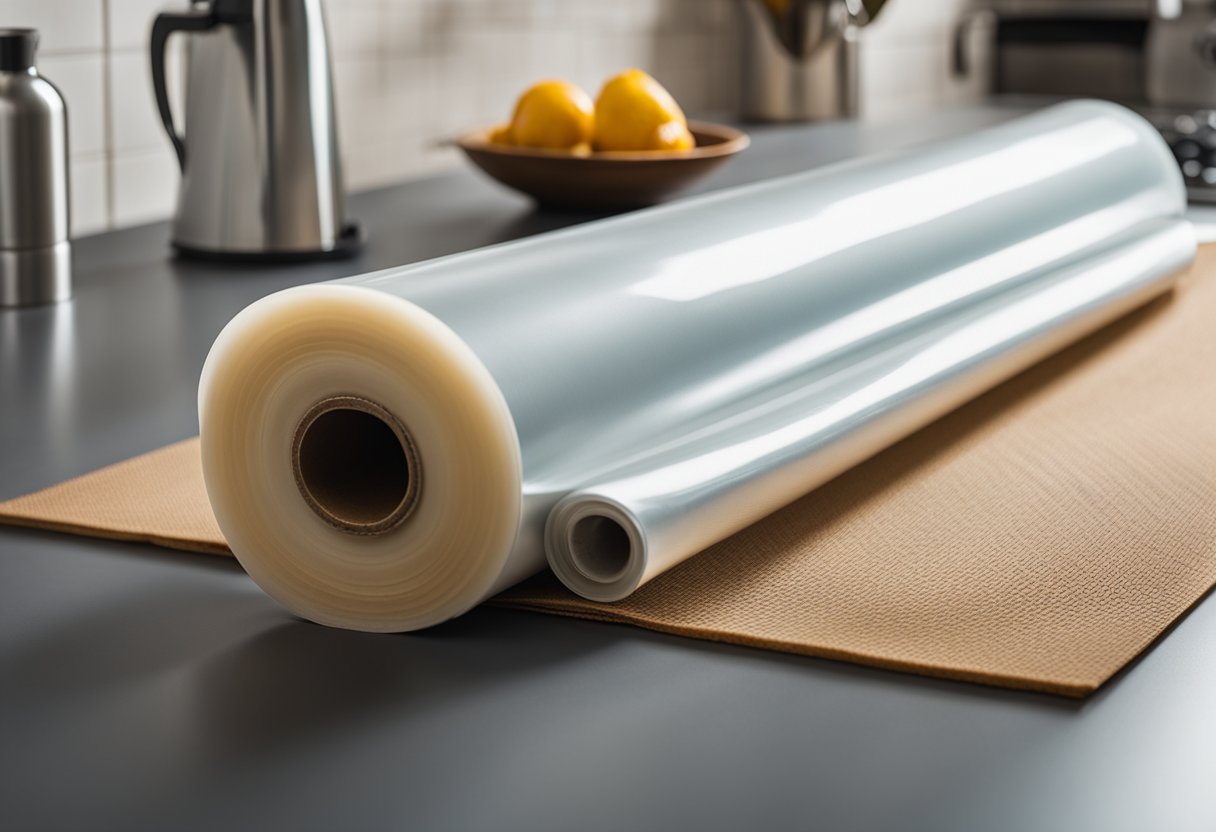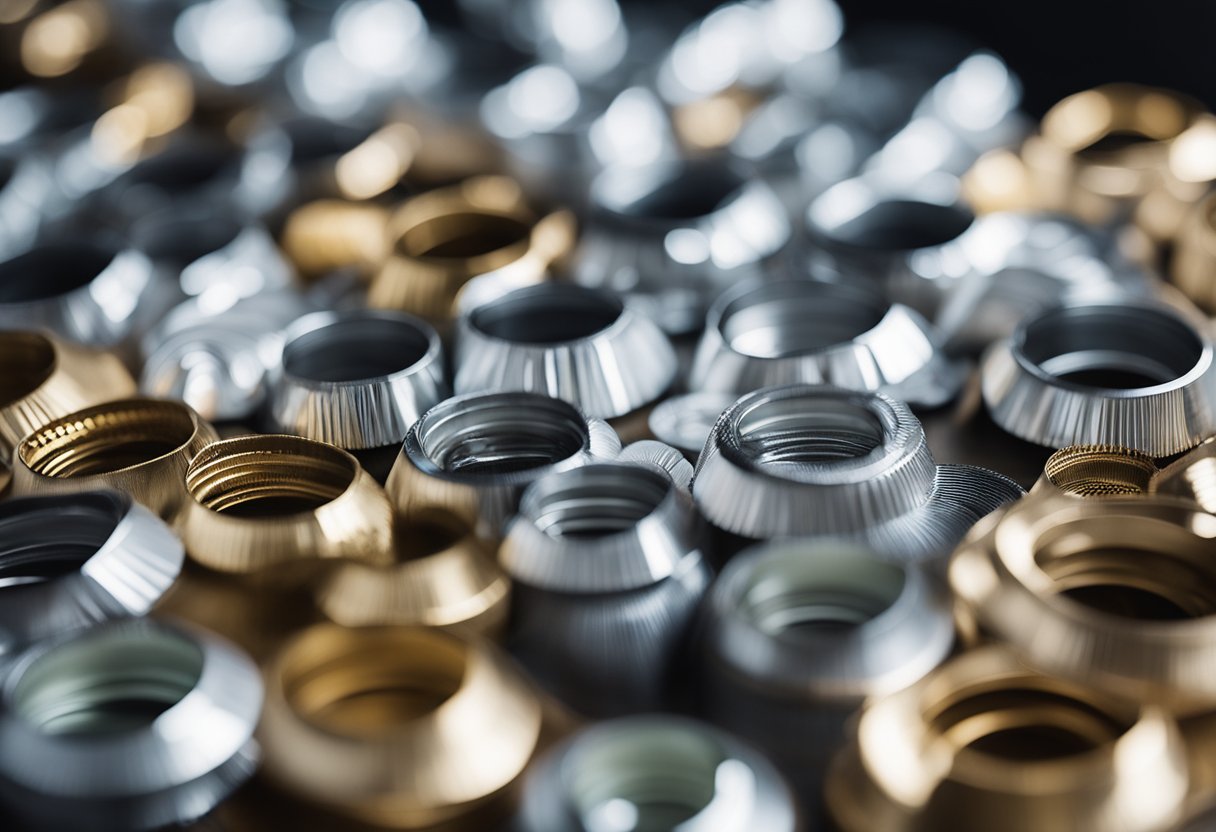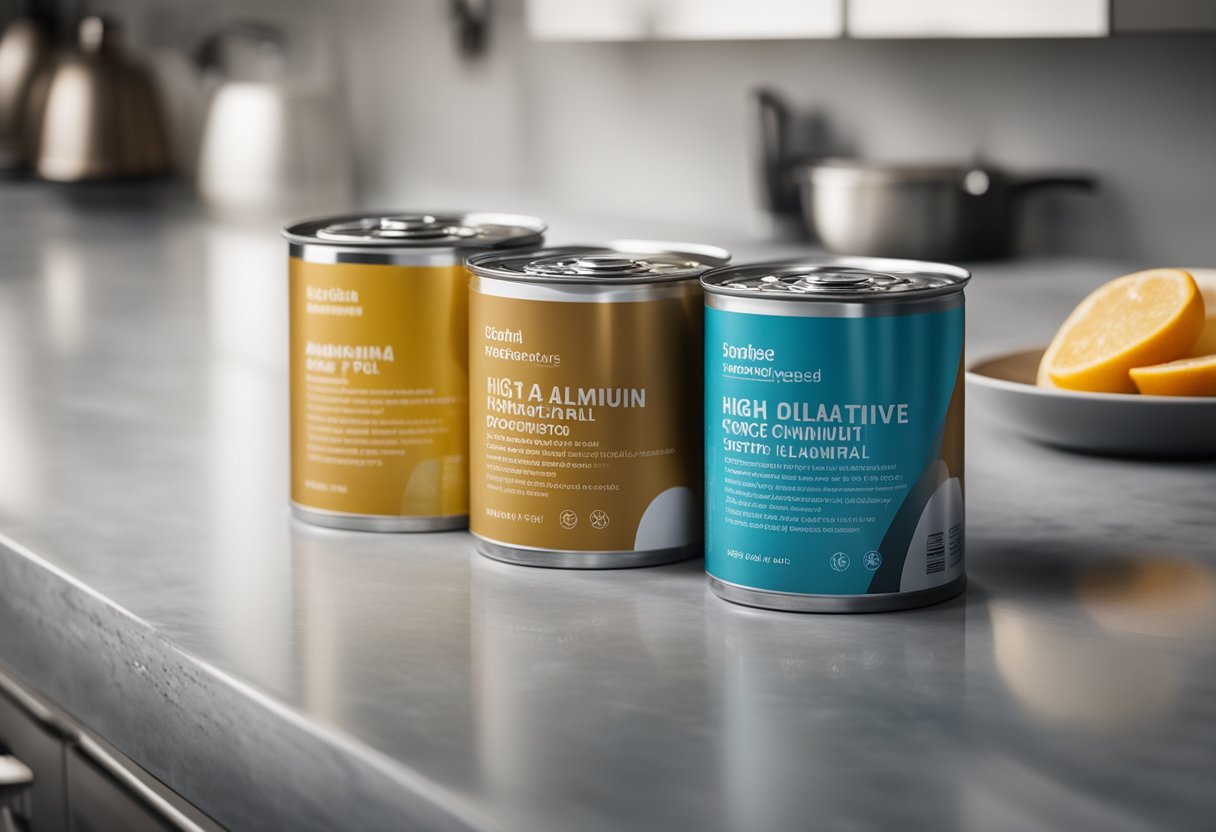As someone who loves to cook and bake, I often find myself relying on aluminum foil for everything from lining baking sheets to wrapping up leftovers.
However, there are growing concerns about the health and environmental impacts of using aluminum foil, which has led me to explore alternative options.

Understanding Aluminum Foil Aluminum foil is a thin, flexible sheet of aluminum metal that is commonly used for cooking, baking, and food storage.
While it is convenient and versatile, there are concerns about its potential health risks, such as leaching aluminum into food and contributing to Alzheimer’s disease.
Additionally, the production and disposal of aluminum foil can have negative environmental impacts.
Substitutes for Aluminum Foil Fortunately, there are many substitutes for aluminum foil that are safer and more eco-friendly. Some options include reusable silicone baking sheets, beeswax wraps, and glass or ceramic containers for food storage.
For grilling, you can use a cast iron skillet or grilling basket instead of aluminum foil packets. By making these simple swaps, you can reduce your exposure to harmful chemicals and help protect the planet.
Key Takeaways
- Aluminum foil has health and environmental concerns, prompting the search for alternatives.
- Reusable silicone baking sheets, beeswax wraps, and glass or ceramic containers are eco-friendly substitutes for aluminum foil.
- Cast iron skillets or grilling baskets can be used instead of aluminum foil for grilling.
Understanding Aluminum Foil

As a kitchen staple, aluminum foil is a popular choice for wrapping and storing food. It is a thin, flexible sheet made of aluminum, which is a lightweight, durable, and heat-conducting metal.
One of the key features of aluminum foil is its malleability, which allows it to be easily shaped and molded to fit various containers and food items. It is also resistant to moisture, light, and odors, making it an ideal material for food preservation.
Aluminum foil is an excellent heat conductor, which means it can withstand high temperatures and distribute heat evenly. This makes it a popular choice for cooking and baking, as well as for grilling and barbecuing.
However, there are some concerns about the safety of using aluminum foil, particularly when it comes into contact with acidic or salty foods.
When heated, aluminum foil can release small amounts of aluminum into the food, which can accumulate in the body over time.
To reduce the risk of aluminum exposure, it is recommended to use alternatives to aluminum foil whenever possible.
There are many substitutes available, such as silicone food covers, parchment paper, and beeswax wraps, that can provide similar benefits without the potential health risks.
Health and Environmental Concerns
As someone who cares about their health and the environment, I am aware of the potential health risks and environmental impact of using aluminum foil.
According to the World Health Organization, exposure to high levels of aluminum can lead to renal impairment, bone disorders such as osteoporosis, and potentially harmful effects on the nervous system.
Additionally, some studies have suggested a possible link between aluminum and Alzheimer’s disease.
When it comes to cooking, acidic foods such as tomatoes, citrus fruits, and vinegar can cause aluminum to leach into the food. This is especially true when the foil is heated or exposed to high temperatures.
As an alternative, I have found that using glass or stainless steel containers can be a safer option for storing and cooking food.
In addition to the potential health risks, the production and disposal of aluminum foil can also have negative environmental consequences.
Aluminum mining and production can result in harmful substances being released into the air and water, and the majority of aluminum foil ends up in landfills where it can take hundreds of years to decompose.
To reduce my environmental impact, I have started using eco-friendly alternatives to aluminum foil such as beeswax wraps, silicone baking mats, and reusable aluminum foil sheets.
These options are not only better for the environment but can also be more cost-effective in the long run.
Overall, while aluminum foil may be a convenient option for cooking and storing food, it is important to be aware of the potential health risks and environmental concerns associated with its use.
By making small changes in our daily lives, we can take steps towards a healthier and more sustainable future.
Substitutes for Baking
When it comes to baking, aluminum foil is a common go-to for lining baking sheets and wrapping food. However, there are several alternatives that can be just as effective.
One popular substitute for aluminum foil is parchment paper. Parchment paper is non-stick and can withstand high oven temperatures, making it a great option for baking cookies, cakes, and other desserts.
It can also be used to line baking sheets and cake pans, making cleanup a breeze.
Another option is silicone baking sheets or mats. These are reusable and affordable, and offer a better non-stick surface than aluminum foil. They are also dishwasher safe, making them easy to clean.
Beeswax wraps are a great alternative to aluminum foil for wrapping food. They are made from cotton fabric coated in beeswax, and can be molded to fit the shape of your food. They are also reusable and can be washed with soap and water.
Wax paper is another option for lining baking sheets and wrapping food. However, it is not heat-resistant and should not be used in the oven.
When using substitutes for aluminum foil, it is important to pay attention to oven temperatures and adjust cooking times as necessary.
Non-stick sprays are also not necessary when using non-stick alternatives like parchment paper and silicone baking sheets.
Overall, there are several substitutes for aluminum foil when it comes to baking. Whether you’re making cakes, cookies, or other recipes, there are plenty of non-stick options that can make your baking experience easier and more sustainable.
Substitutes for Grilling
When it comes to grilling, aluminum foil is often used to wrap food and prevent it from sticking to the grill grates. However, there are several alternatives to using aluminum foil that can be just as effective.
One option is to use cedar wraps, also known as cedar grilling papers. These are thin sheets of cedar that can be wrapped around food and placed directly on the grill. Cedar wraps add a smoky flavor to the food and are a great alternative to aluminum foil.
Another option is to use a grill basket. This is a metal basket with small holes that can be used to cook vegetables, fish, and other small items on the grill.
Grill baskets are a great way to prevent food from falling through the grill grates and can be easily cleaned.
If you want to add a smoky flavor to your food without using aluminum foil, try using wood chips or chunks.
Soak the wood chips or chunks in water for at least 30 minutes before placing them on the grill. The wood will create smoke, which will infuse your food with a delicious smoky flavor.
Overall, there are several substitutes for aluminum foil when it comes to grilling. Cedar wraps, grill baskets, and wood chips are just a few of the many options available. Experiment with different methods to find the one that works best for you.
Reusable and Eco-Friendly Substitutes

When it comes to finding a substitute for aluminum foil, there are many eco-friendly and reusable options available.
Here are some of the best alternatives to aluminum foil:
Beeswax Wraps
Beeswax wraps are a great alternative to aluminum foil. They are made from organic cotton, beeswax, jojoba oil, and tree resin.
These wraps are perfect for wrapping sandwiches, covering bowls, and storing food. They are reusable and can be washed with cold water and soap. Beeswax wraps are also compostable and biodegradable, making them an eco-friendly alternative to aluminum foil.
Glass Containers
Glass containers are a sustainable substitute for aluminum foil. They are perfect for storing leftovers, meal prepping, and packing lunches.
Glass containers are reusable, durable, and easy to clean. They are also microwave and dishwasher safe, making them a convenient option for busy lifestyles.
Silicone Mats
Silicone mats are a great alternative to aluminum foil for baking. They are non-stick, reusable, and easy to clean. Silicone mats are also dishwasher safe and can be used in the oven up to 480°F.
They are a sustainable substitute for aluminum foil and reduce waste in the kitchen.
Reusable Cloth or Beeswax Food Wraps
Reusable cloth or beeswax food wraps are another great eco-friendly alternative to aluminum foil. They can be used as a lid or wrapping for food storage. Reusable cloth food wraps are made from organic cotton and can be washed and reused for years.
Beeswax food wraps are made from organic cotton, beeswax, jojoba oil, and tree resin. They are perfect for wrapping sandwiches, covering bowls, and storing food. Both options are compostable and biodegradable, making them a sustainable substitute for aluminum foil.
Overall, there are many reusable and eco-friendly substitutes for aluminum foil available. By using these alternatives, we can reduce waste in the kitchen and help protect the environment.
Substitutes for Food Storage
When it comes to storing food, aluminum foil is a popular choice for many people. However, there are several alternatives that are just as effective and even more eco-friendly.
In this section, I will discuss some of these substitutes for food storage.
Resin
Resin is a durable and lightweight material that is perfect for food storage. It is non-toxic and can withstand high temperatures, making it suitable for use in the microwave and dishwasher.
Resin containers come in a variety of shapes and sizes, and many have airtight seals to keep food fresh for longer.
Glass Containers
Glass containers are a great alternative to aluminum foil for storing food. They are non-toxic, reusable, and easy to clean. Glass containers with lids are perfect for storing leftovers, and they come in a variety of shapes and sizes to suit your needs.
Plus, glass containers are microwave and dishwasher safe, making them a convenient choice for busy families.
Beeswax Wraps
Beeswax wraps are a sustainable and reusable alternative to plastic wraps and aluminum foil. Made from organic cotton, beeswax, and jojoba oil, these wraps are perfect for wrapping sandwiches, covering bowls, and storing food in the fridge.
They are washable and can be used again and again, making them a cost-effective and eco-friendly choice.
Plastic Wraps
While plastic wraps are not the most eco-friendly choice, they are still a popular alternative to aluminum foil for food storage.
They are lightweight, easy to use, and come in a variety of sizes. However, it’s important to choose a plastic wrap that is free from harmful chemicals such as BPA and phthalates.
In conclusion, there are several alternatives to aluminum foil for food storage. Resin, glass containers, beeswax wraps, and plastic wraps are all effective options that are eco-friendly and easy to use.
By choosing one of these alternatives, you can reduce your environmental impact and keep your food fresh for longer.
Other Notable Substitutes

In addition to the substitutes mentioned earlier, there are several other notable substitutes for aluminum foil that you may want to consider.
Glass
Glass is a great alternative to aluminum foil for baking, roasting, and broiling. Tempered glass and borosilicate glass are both oven-safe and can withstand high temperatures. They are also easy to clean and reusable, making them an eco-friendly option.
Stainless Steel
Stainless steel is another great alternative to aluminum foil. It is durable, reusable, and can be used for baking, roasting, and broiling. Stainless steel is also dishwasher safe, making it easy to clean.
Natural Products
There are several natural products that can be used as a substitute for aluminum foil. Banana leaves, for example, can be used to wrap food for grilling or baking. Parchment paper is another great option for baking and roasting.
Dutch Oven
A Dutch oven is a great alternative to aluminum foil for slow-cooking meals. It is made of cast iron and can be used on the stovetop or in the oven. Dutch ovens are great for making stews, soups, and casseroles.
Antacids, Buffered Aspirin, Antiperspirants, and Cosmetics
While not exactly a substitute for aluminum foil, it is worth noting that many antacids, buffered aspirin, antiperspirants, and cosmetics contain aluminum.
If you are looking to reduce your exposure to aluminum, you may want to consider using alternatives to these products.
Conclusion

In conclusion, there are several cost-effective alternatives to aluminum foil that can be used for various kitchen tasks.
These substitutes offer versatility and can enhance your cooking experience by allowing you to experiment with different cooking methods.
Silicone food covers are a great option for wrapping and packaging food, as they are reusable and easy to clean. They are also microwave and dishwasher safe, making them a convenient choice for everyday use.
Parchment paper is another versatile substitute that can be used for baking and roasting. It is also non-stick, which makes it a great option for cooking protein, such as chicken or fish.
For grilling or broiling, a cast iron skillet or griddle can be used instead of aluminum foil. These cooking tools retain heat well and can create a delicious sear on meats and vegetables.
Overall, the use of aluminum foil can be limited by exploring these substitutes. Not only are they cost-effective, but they can also enhance your cooking experience by offering new and exciting ways to prepare your favorite dishes.
Frequently Asked Questions

What are some eco-friendly alternatives to aluminum foil?
If you’re looking for eco-friendly alternatives to aluminum foil, there are several options to choose from. Beeswax food wraps are a great alternative to aluminum foil.
They’re made of beeswax, cotton, and tree resin and work like a charm to keep food fresh. Silicone food covers are also a good option for covering leftovers.
Parchment paper is another eco-friendly alternative that can be used for baking or wrapping food.
What are some non-toxic substitutes for aluminum foil?
If you’re looking for non-toxic substitutes for aluminum foil, there are several options available. Parchment paper is a good non-toxic option that can be used for baking or wrapping food.
Beeswax food wraps are also non-toxic and can be used to wrap food. Glass containers with lids are another non-toxic option for storing food.
What can be used instead of aluminum foil for baking chicken?
If you’re looking for a substitute for aluminum foil when baking chicken, parchment paper is a good option. Simply place the chicken on a sheet of parchment paper and bake as usual. You can also use a baking dish with a lid instead of aluminum foil.
What can I use if I don’t have foil to cover my baking dish?
If you don’t have aluminum foil to cover your baking dish, you can use a lid if your dish has one. If not, you can use a sheet of parchment paper or a silicone food cover to cover the dish.
Can you substitute foil for baking?
Yes, there are several substitutes for aluminum foil when baking. Parchment paper is a good substitute that can be used to line baking sheets or wrap food. Silicone baking mats are also a good option for lining baking sheets.
Glass or ceramic baking dishes with lids can be used instead of aluminum foil to cover food while baking.
What can I use instead of aluminum foil for hookah?
If you’re looking for a substitute for aluminum foil when smoking hookah, you can use a metal screen or a hookah bowl with a built-in screen. These options can be reused and are less wasteful than using aluminum foil.
